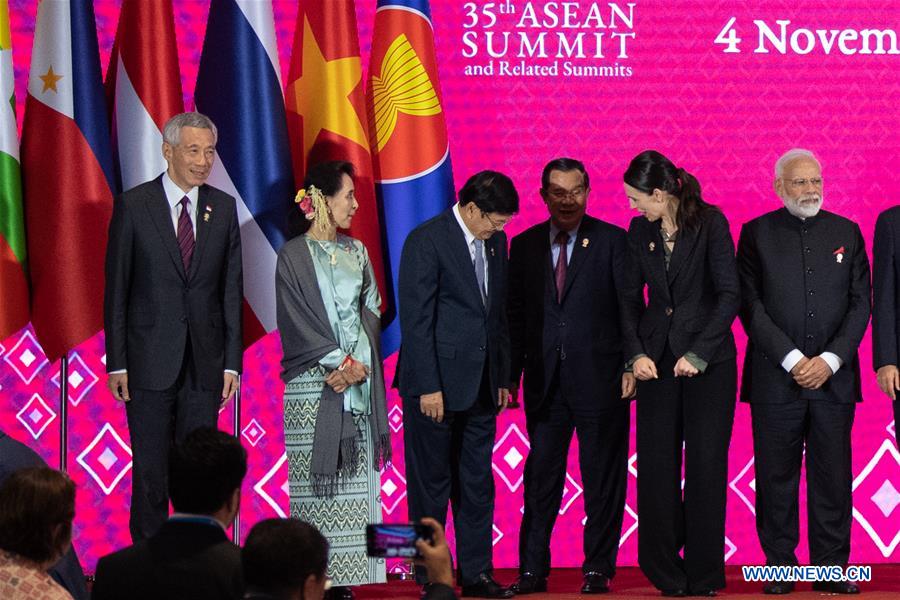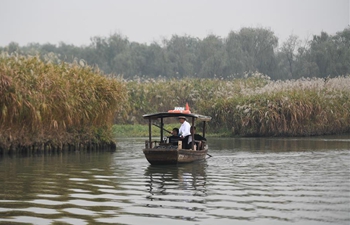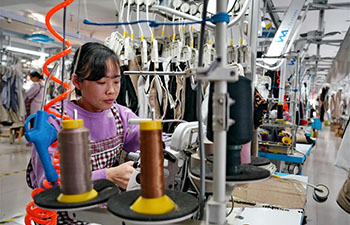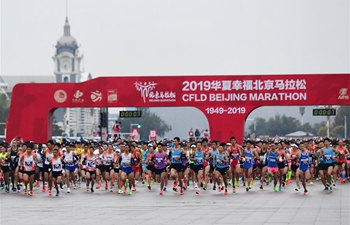
(From L to R) Singaporean Prime Minister Lee Hsien Loong, Myanmar State Counselor Aung San Suu Kyi, Lao Prime Minister Thongloun Sisoulith, Cambodian Prime Minister Samdech Techo Hun Sen, New Zealand Prime Minister Jacinda Ardern and Indian Prime Minister Narendra Modi react during a photo session of the 3rd Regional Comprehensive Economic Partnership (RCEP) Summit in Bangkok, Thailand, Nov. 4, 2019. (Xinhua/Zhu Wei)
by Dan Ran, Lin Hao
BANGKOK, Nov. 4 (Xinhua) -- Leaders of the Association of Southeast Asian Nations (ASEAN) and their dialogue partners concluded a series of summits here Monday, with major progress achieved in the negotiations of the Regional Comprehensive Economic Partnership (RCEP), although India has "significant outstanding issues" that were unresolved.
ASEAN and its dialogue partners also agreed on a range of tangible measures to facilitate connectivity and promote sustainable development during the three-day gathering.
Apart from a summit between its 10 member states, ASEAN also held separate summits with dialogue partners under mechanisms such as 10+1 and 10+3, while the East Asia Summit between ASEAN and eight more countries, including the United States and Russia, was also held.
RCEP NEGOTIATIONS ACHIEVE MAJOR BREAKTHROUGH
According to a joint leaders' statement issued after a RCEP summit on Monday evening, "15 RCEP participating countries have concluded text-based negotiations for all 20 chapters and essentially all their market access issues, and tasked legal scrubbing by them to commence for signing in 2020."
However, "India has significant outstanding issues, which remain unresolved," the statement said, adding "all RCEP participating countries will work together to resolve these outstanding issues in a mutually satisfactory way."
"India's final decision will depend on satisfactory resolution of these issues," it added.
The RCEP is a proposed mega trade pact between 10 ASEAN member states and their six free trade partners - China, Japan, South Korea, India, Australia and New Zealand. Once in operation, it will become the world's largest free trade agreement, covering 32.2 percent of global GDP and 3.5 billion people, or almost half of the world's population. RCEP economies account for 29.1 percent of global trade and about one-third of global investment inflows.
Chheang Vannarith, president of the Asian Vision Institute, said consumers will enjoy more affordable and more diversity of products from RCEP member countries, adding that logistics plays an important role in reducing transportation cost. "Physical connectivity projects and custom reforms need to be further enhanced to realize the potentials deriving from RCEP," he said.
The RCEP will "open the new door of opportunities for the least developed countries such as Cambodia, Laos, Vietnam and Myanmar in the bloc," said Joseph Matthews, senior professor at the BELTEI International University in Phnom Penh.
ASEAN, CHINA ALIGN DEVELOPMENT PLANS FOR CONNECTIVITY
During this year's ASEAN-China summit, the two sides took another step forward to promote the strategic partnership by synergizing the Master Plan on ASEAN Connectivity (MPAC) 2025 and the Belt and Road Initiative (BRI).
The two sides will draw on each other's comparative advantages and work together to promote infrastructure development, mobilize financial sources, facilitate digital transformation and enhance policy dialogues and people-to-people exchanges to pursue all-round connectivity in the region.
"We need better connectivity for regional growth. The Master Plan on ASEAN Connectivity (MPAC) 2025 might not accomplish as much on its own but together with the Belt and Road, I can see an easier flow of goods and services into ASEAN from China and vice versa," said Tan Kok Wai, Malaysian government's special envoy to China.
To achieve sustainable development at the digital age, ASEAN and China will also work together in building a smart cities network, exploring science, technology and innovation cooperation to improve people's livelihood in the urbanization process.
They agreed to encourage the establishment of mutually-beneficial city partnerships between ASEAN cities, in particular those under the ASEAN Smart Cities Network, and Chinese cities, such as Nanning, Xiamen, Hangzhou, Ji'nan, Kunming, Shenzhen, Nanjing and Chengdu.
BUILDING SUSTAINABLE ASEAN COMMUNITY
The ASEAN summit and related summits were held under the theme "Advancing Partnership for Sustainability." The bloc is committed to "promoting partnership for sustainability in order to realize a people-oriented and people-centered ASEAN Community that leaves no one behind," said the chairman's statement issued after the ASEAN summit.
ASEAN aims to move forward with dynamism to be able to capture the benefits and opportunities of the fourth industrial revolution, promote partnerships and connectivity and to bring about sustainability in all dimensions, said Thai Prime Minister Prayut Chan-o-cha on Monday during the closing ceremony of the summits.
"People will benefit from the promotion of the 'Connecting the Connectivity' strategy, which will promote synergies between various regional connectivity strategies and the MPAC 2025 on the basis of ASEAN centrality," said Prayut.
In this regard, ASEAN has announced 19 priority infrastructure projects considered to have the potential to attract joint investment from the public and private sectors, he said.
ASEAN has also given priority to cooperation of social and cultural issues including combating marine debris, tackling natural disasters and climate change, as well as promoting children's rights in particular strengthening education for out of school children and youth, said the prime minister, adding "three Cs" namely continuity, complementarity and creativity are need to ensure sustainability in ASEAN.
UPHOLDING MULTILATERALISM AMID HEADWINDS
This year's summits were held at a time when the ASEAN and the world are facing myriad challenges including economic slowdown, rising unilateralism and protectionism, among others.
As one of the fastest growing regions in the world, ASEAN emphasized the commitment to upholding a transparent, open, inclusive, and rules-based multilateral trading system, according to the chairman's statement issued after the ASEAN summit.
ASEAN members and many of its dialogue partners reiterated the need of upholding free trade and multilateralism and promoting regional integration.
In the chairman's statement of the ASEAN-China summit, both sides reaffirmed their "strong support for multilateralism and regionalism, and for the rules-based international order based on the principles of international law, mutual interests and mutual respect."
The progress made in RCEP negotiations also demonstrated the commitment of various countries to multilateral free trade, experts said.
"Multilateralism trade approach is swiftly replacing unilateralism and protectionism, which are enemies and even economic cancer of the global development," said Matthews of the BELTEI International University.
Established in 1967, ASEAN groups Brunei, Cambodia, Indonesia, Laos, Malaysia, Myanmar, the Philippines, Singapore, Thailand and Vietnam.
(Xinhua reporter Mao Pengfei in Phnom Penh also contributed to the story)











